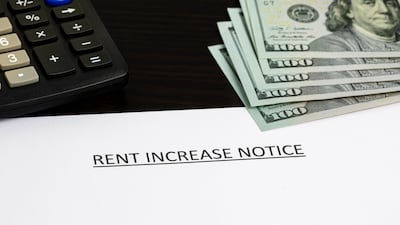Question: My landlord served 12 months’ notice for me to vacate on the grounds that she intends to sell the property. She owns other properties in Dubai, too.
She assured me that I will not be asked to leave when the sale happens. So far, the sale has not taken place.
A few days ago, she asked for a full year’s rent in advance, in which case she said the eviction notice would be withdrawn and the tenancy agreement renewed for one more year.
I offered to pay a partial sum as advance rent. There has been no response from my landlord to this.
In case the villa is not sold (by the end of the 12-month notice), should I vacate the premises or can I continue to live here? How will the renewal of tenancy happen?
Can my landlord serve another notice to increase rent (within the 90-day window before expiry of the current tenancy agreement) while the eviction notice is still in place?
I spent a considerable amount of money on the property on the understanding that the landlord would not evict me for three years. I have WhatsApp conversations as proof of this.
For the first renewal of the tenancy agreement, she took advance rent citing financial issues and I accommodated her request.
What legal recourse do I have? I wish to live in this property for at least another year. SR, Dubai
Answer: If the reason for the 12 months’ eviction is for selling and no sale has taken place, then while the property remains for sale, you have the right to stay and renew if that is what you want to do.
If during this time, the landlord has given the tenant at least 90 days’ notice from the renewal date of any changes to the new tenancy contract, including rent, then he/she has every right to request the higher rent, but only if the Real Estate Regulatory Agency’s rental calculator states this is allowed.
There must be a reason to evict a tenant. A 12 months’ notice period has to be observed for the four reasons below:
a. For sale
b. For moving in themselves, or their next of kin of first degree
c. For extensive modernisation, and
d. For demolition
For the last two points, there needs to be consent or technical reports from entities concerned.
WhatsApp conversations can be used as evidence in case of breakdown in relations, where the parties go on to court.
With all your points, it’s about reaching an amicable agreement and/or finding some common ground, one where both parties potentially have to give a little on their chosen points to reach an amicable solution.
If this cannot be found, despite being reasonable, a tenant can always file a case at the Rent Dispute Settlement Committee, which will cost 3.5 per cent of the rent amount.
Trust in the process to get a judgment from the RDSC.
Q: I have been a tenant in a villa for the past three years.
The owner served us with a 12 months’ eviction notice from a Dubai court and we vacated the villa at the end of the notice period.
The reason for the eviction was for personal use by the landlord.
I am aware from the tenancy law that I can file a case at the RDSC if the owner rents out the villa immediately or in the next two years.
However, if the owner moves into the villa for a certain period of time within two years and then rents it out to another tenant, can I file a case for compensation? MR, Dubai
Answer: Your statement is correct. If a tenant is evicted and the reason given is for the use of the landlord and/or the next of kin of first degree, he/she cannot re-let the property for a period of two years for residential and three years for commercial.
Your question is interesting and according to law 33 of 2008, what I have just confirmed above is correct.
However, the law is silent on what happens if the owner moves in for a period of time, then vacates and goes on to re-let the property.
Technically, I would summarise that irrespective of this moving in and out, the period of time is at the essence.
The owner is not allowed to re-let the property for two years, so I have to assume that whether the landlord moves in and stays for a while, but then re-lets during the two-year period, they are breaking the law and the ousted tenant can file a case against this, within the two-year window.
I am not aware of any outcomes at the RDSC from examples such as yours. But if we follow the exact wording of the law, it would make sense that no let is allowed within the two-year period unless, of course, the landlord gets a no-objection letter from the ousted tenant.
Mario Volpi is the sales director at AX Capital. He has worked in the property sector for 40 years in London and Dubai. The opinions expressed do not constitute legal advice and are provided for information only. Please send any questions to m.volpi@axcapital.ae

